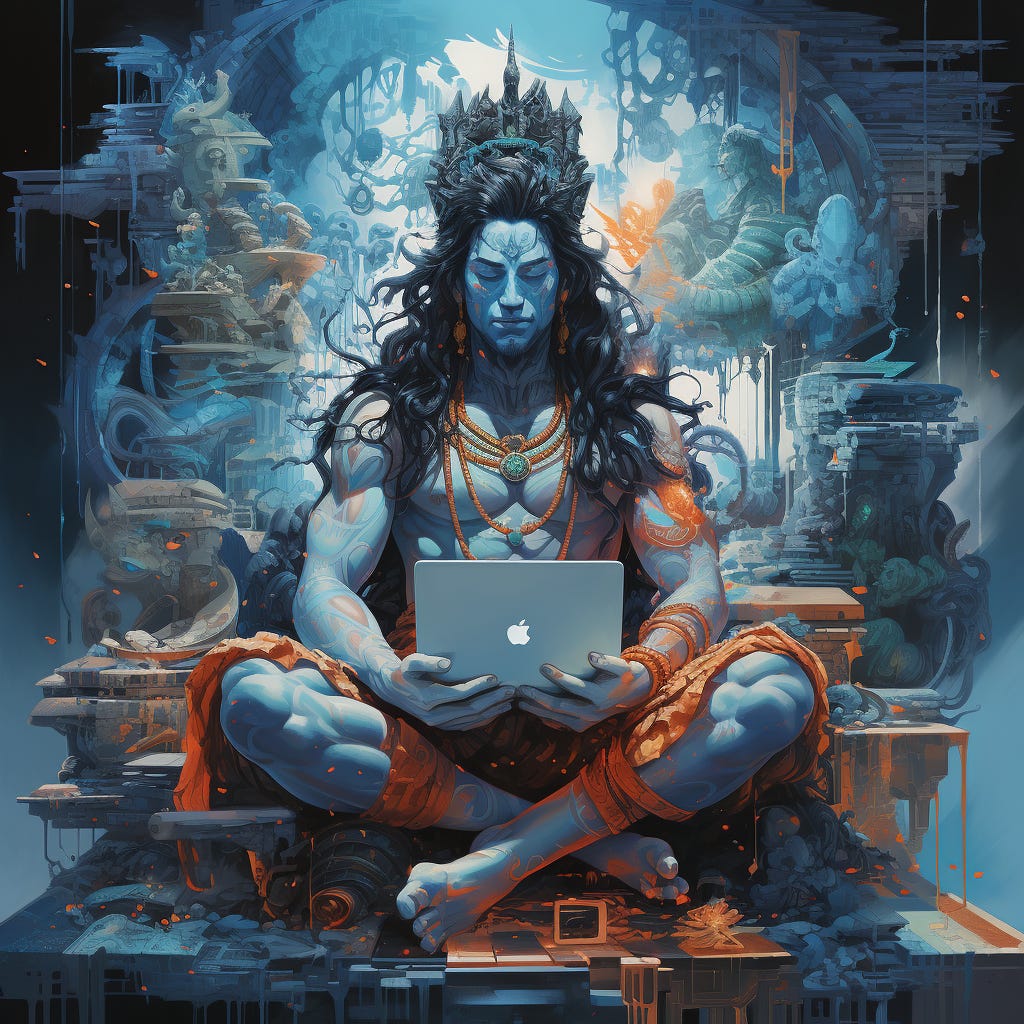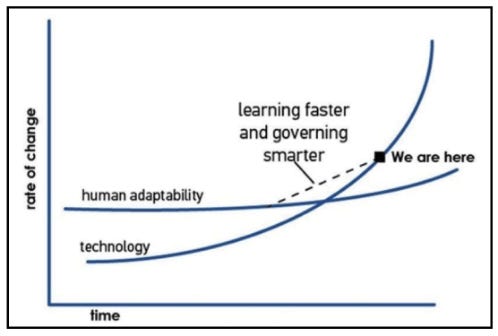Reinventing Yourself for the Future: The Power of Creative Destruction
Are you feeling overwhelmed by the speed of our modern world?
It’s not only the climate that’s changing rapidly; technology, society, and just about everything you can imagine evolves at an astonishing rate.
Rather than being intimidated by this speed, we should embrace it and use it to our benefit.
“Accelerating our pace”, you say? But we’re already in the midst of a frenzied competition!
Slowing down to speed up
In his book “Thank you for being late”, Thomas Friedman explains that we must teach ourselves to navigate the divide between human adaptability and technological advancement through the principle of resilience.
Don’t be discouraged reading this. The answer does not primarily lie in increasing speed, but also in the mindful cultivation of slowing down.
We seem to live in the age of acceleration, with exponential increases in computing power, economic interdependence, and changes in both the natural world and our collective believe systems.
These changes have created both opportunities and challenges, making it easier for some to be “makers” or “breakers,” but harder for others to lead or just be “average.”
To cope with these changes, we must learn 3 simple things:
Being Fast (innovative and quick to adapt),
Being Fair (prepared to help those affected by change), and
Being Slow (able to access our values and filter out the noise).
Slowing down is the most counterintuitive thing you can think of, right?
Nevertheless, it’s one of the most crucial elements to reinvent yourself. So get a decent night of sleep, take more vacation than you’ld allow yourself and align yourself with the rhythm of nature.
Context is everything
To understand our — sometimes crazy — present, it can be helpful to look back at a time when politics worked and the middle class was more attainable, and consider how these changes have impacted our world today.
“We study history not to know the future but to widen our horizons, to understand that our present situation is neither natural nor inevitable, and that we consequently have many more possibilities before us than we imagine.” — Yuval Noah Harari
In this quote, Harari suggests history isn’t primarily about predicting the future, but rather understanding past and present. By examining past events and conditions, we gain insight into our current circumstances and recognise more options available to us.
The ability to put things into context allows us to think critically about our choices and direction in the present.
Think Critically
The ability to think critically is a crucial soft skill that is essential to thrive and survive, now and in the future.
It is often thought that capitalism has reduced the amount of hard labor required by humans, but this is not the case. In fact, the opposite is true.
You are working longer hours than a medieval peasant!
Before capitalism, most people did not work very long hours. They had a lot of leisure time and the pace of work was relaxed. However, when capitalism raised their incomes, it also took away their leisure time.
In the 19th century, people worked incredibly long hours — possibly the longest in human history. In contrast, during the medieval period, the typical workday was only about 8 hours, with breaks for meals and rest. In reality, the worker fighting for an 8-hour workday in the 19th century was trying to reclaim the leisure time enjoyed by their ancestors centuries before. (Reference)
Look after yourself
Incited by the recent pandemic, we learned that productivity doesn’t equal being present at a desk for eight hours a day. The majority of employers have come to understand the benefits of trusting their employees, and — leaving Elon or the people at JpMorgan — aside, hybrid work has become the new norm.
But it doesn’t stop there, it’s all about finding balance.
Finding balance is key to looking after your mental and physical health, reducing stress, and having time for important things. Contrary to popular belief, it doesn’t mean dividing time equally between work and other life activities, but rather finding out what works best for you.
It’s about having meaningful work. Work that allows you to be yourself. Not having to leave a big part of your personality at the front door of your office building.
And it’s about companies that don’t think having a chill room with a ping pong table, tropic plants or heaven forbid, a wide selection of chai tea, is a substitute for good company culture and values.
Release Early and Often
For those that are into writing software, frequently releasing a new version of their code is business as usual.
Even more so, timely pulling the plug out of an old release is crucial to keep your software product profitable, maintainable and attractive to its users.
It’s now more critical than ever to start developing and releasing a new version of yourself. Not once or twice but continuously , incrementally and ever faster.
You can reinvent yourself for conviction or necessity. I leave it up to you which one it’s going to be.
“If you defer investing your time and energy until you see that you need to, chances are it will already be too late.”― Clayton M. Christensen — How Will You Measure Your Life?
Releasing a new version of yourself means identifying patterns, values, or activities that no longer serve you and changing them for better options.
Don’t start from Scratch
Another story we like to tell ourselves is that we’ll have to start from scratch.
True, learning is the challenging process of changing our minds, of developing new behaviours, habits, and heuristics based on new information. This is difficult, often emotional work.
But never underestimate the skills and abilities that you already have. Our true power skills are those that may be used in a variety of contexts.
These ‘transferable skills,’ such as problem solving, critical thinking, communication, creativity and teamwork, are the skills that take the longest to build, but have the greatest value.
So, you actually never really start from scratch.
The stronger and more diverse your transferrable skills are, the easier it is to reinvent yourself once in a while, and to become excellent in whatever you want in no time.
Stop being a people pleaser
“In your life, there are going to be constant demands for your time and attention. How are you going to decide which of those demands gets resources? The trap many people fall into is to allocate their time to whoever screams loudest, and their talent to whatever offers them the fastest reward. That’s a dangerous way to build a strategy.” ― Clayton M. Christensen, How Will You Measure Your Life?
If you ’re a people pleaser, you might have spent many years living and making choices in service to others.
Of course, people pleasers have beautiful qualities. Thanks to this characteristic you can listen very well to others, solve conflicts and people generally like you :-)
But what if you consider the wants and needs of others more important than your own needs and desires?
Do you recognise yourself?
While it may feel good at times being a people pleaser. Make sure you don’t hold back on the things you want. It’s only when you are able to meet your own needs, that you should focus on meeting the needs of others.
Define your own Metrics
Just imagine, at the time you’re old and grey you start looking back at your life. What do you think you’ll regret the most?
Will it be the failures that happened when you took a plunge and decided to reinvent yourself?
Or will it be the soaring remorse of not having tried? Of the paths not taken?
You can either take control of your life and start living by the metrics you define or you can continue living on the crowdsourced vanity metrics of others.
Living by your own true metrics is what makes you happy and accountable. It helps you reach your own goals.
Just give it some thought, finding what makes you tick is easier than you might think. If you lack inspiration, these Life metrics by Blaz Kos are an excellent start.
What about a metric that stimulates you to reinvent yourself each couple of years?
Embrace Chaos and Uncertainty
We often have a hard time giving up our certainties. But let’s face it, certainties are just a product of our mind.
It’s easier to accept that we life in a Volatile, Uncertain and Complex world that is filled with Ambiguities.
Instead of trying to resist this chaos and uncertainty, there are some easy tricks that will help you confidently navigate (y)our complex world:
Pay attention, to what you pay attention to: It’s easy to drift, like a leaf on the river of influences around you. Attention is one of the most precious currencies in our life. So we’d better start carefully refocusing our attention on the things that are worth it.
Shape the environment, that shapes you: The most effective way to shape your environment is by creating your own healthy habits. A habit is a decision that is made outside of our conscious awareness. Habits are so powerful because of this unconscious formation. Their strength lies in their ability to distill lots of information into a single, effective routine.
Celebrate your Wins: We often tend to focus on the few things that go wrong instead of the many things that go right. Setting yourself small goals, and celebrating when achieving these, no matter how insignificant, rewires your brain, and keeps anxiety from taking the best of you.
Dare to Destroy
As for how creative destruction can help with this? It’s all about embracing the concept of “out with the old, in with the new.”
By continuously reinventing ourselves and updating our approach to the world, we can stay ahead of the curve and be better equipped to navigate the fast-changing world we call home.
To dare to destroy is to dare to grow, evolve, and continuously strive for improvement.
So embrace change, shatter your comfort zones, and venture bravely into the unknown. By doing so, you unlock potential, stimulate growth, and ultimately set the stage for a brighter, more adaptive future.





